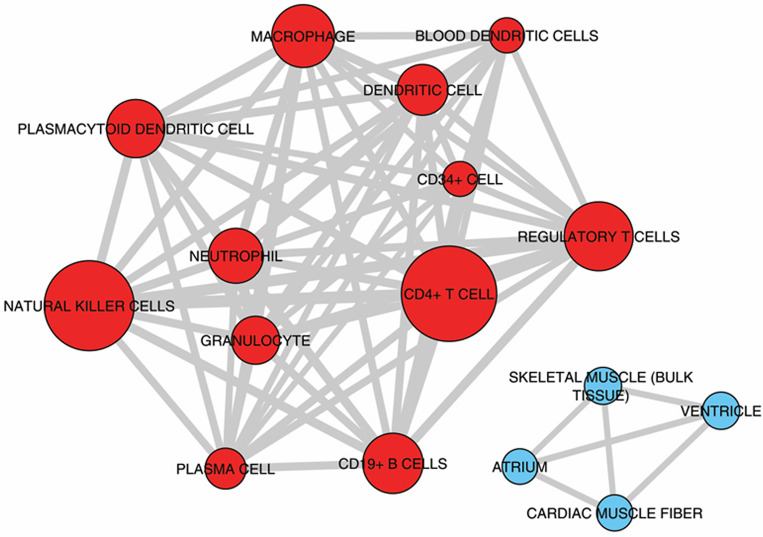miRNAs may play a major role in the control of gene expression in key pathobiological processes in Chagas disease cardiomyopathy.
Chronic Chagas disease cardiomyopathy (CCC), an especially aggressive inflammatory dilated cardiomyopathy caused by lifelong infection with the protozoan Trypanosoma cruzi, is a major cause of cardiomyopathy in Latin America. Although chronic myocarditis may play a major pathogenetic role, little is known about the molecular mechanisms responsible for its severity. The aim of this study is to study the genes and microRNAs expression in tissues and their connections in regards to the pathobiological processes. To do so, we integrated for the first time global microRNA and mRNA expression profiling from myocardial tissue of CCC patients employing pathways and network analyses. We observed an enrichment in biological processes and pathways associated with the immune response and metabolism. IFNγ, TNF and NFkB were the top upstream regulators. The intersections between differentially expressed microRNAs and differentially expressed target mRNAs showed an enrichment in biological processes such as Inflammation, inflammation, Th1/IFN-γ-inducible genes, fibrosis, hypertrophy, and mitochondrial/oxidative stress/antioxidant response. MicroRNAs also played a role in the regulation of gene expression involved in the key cardiomyopathy-related processes fibrosis, hypertrophy, myocarditis and arrhythmia. Significantly, a discrete number of differentially expressed microRNAs targeted a high number of differentially expressed mRNAs (>20) in multiple processes. Our results suggest that miRNAs orchestrate expression of multiple genes in the major pathophysiological processes in CCC heart tissue. This may have a bearing on pathogenesis, biomarkers and therapy.
Authors
Laurie Laugier; Ludmila Rodrigues Pinto Ferreira; Frederico Moraes Ferreira; Sandrine Cabantous; Amanda Farage Frade; Joao Paulo Nunes; Rafael Almeida Ribeiro; Pauline Brochet; Priscila Camillo Teixeira; Ronaldo Honorato Barros Santos; Edimar A Bocchi; Fernando Bacal; Darlan da Silva Cândido; Vanessa Escolano Maso; Helder I Nakaya; Jorge Kalil; Edecio Cunha-Neto; Christophe Chevillard
External link
Publication Year
Publication Journal
Associeted Project
Systems Immunology of Human Diseases
Lista de serviços
-
RASL11A, member of a novel small monomeric GTPase gene family, is down-regulated in prostate tumors.RASL11A, member of a novel small monomeric GTPase gene family, is down-regulated in prostate tumors.
-
Splice variants of TLE family genes and up-regulation of a TLE3 isoform in prostate tumors.Splice variants of TLE family genes and up-regulation of a TLE3 isoform in prostate tumors.
-
Concepts on Microarray Design for Genome and Transcriptome AnalysesConcepts on Microarray Design for Genome and Transcriptome Analyses
-
The iron stimulon of Xylella fastidiosa includes genes for type IV pilus and colicin V-like bacteriocins.The iron stimulon of Xylella fastidiosa includes genes for type IV pilus and colicin V-like bacteriocins.
-
Origins of the Xylella fastidiosa prophage-like regions and their impact in genome differentiation.Origins of the Xylella fastidiosa prophage-like regions and their impact in genome differentiation.
-
The role of prophage in plant-pathogenic bacteria.The role of prophage in plant-pathogenic bacteria.
-
Genetic control of immune response and susceptibility to infectious diseases.Genetic control of immune response and susceptibility to infectious diseases.
-
Building capacity for advances in tuberculosis research; proceedings of the third RePORT international meeting.Building capacity for advances in tuberculosis research; proceedings of the third RePORT international meeting.
-
São Paulo School of Advanced Sciences on Vaccines: an overview.São Paulo School of Advanced Sciences on Vaccines: an overview.
-
A reasonable request for true data sharing.A reasonable request for true data sharing.

